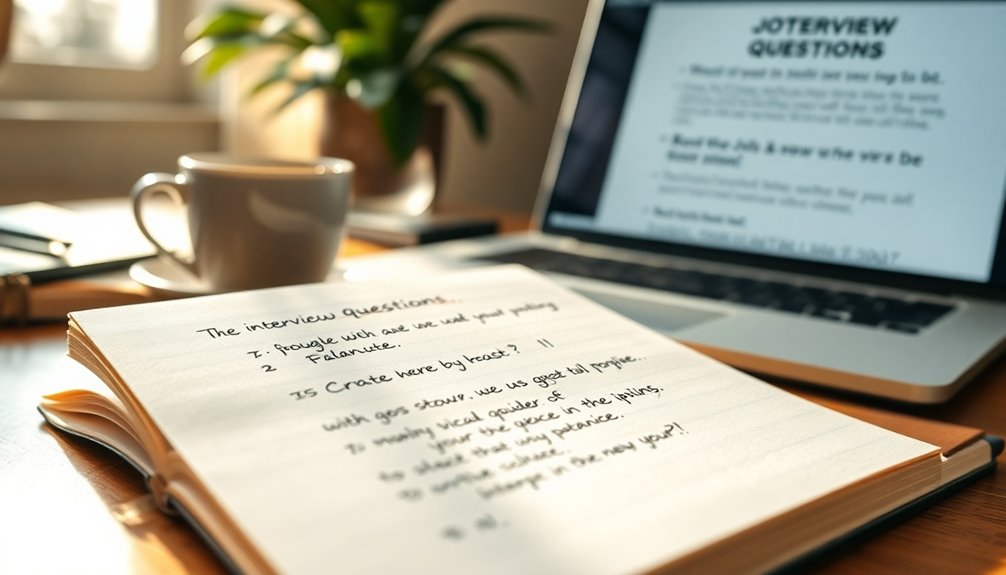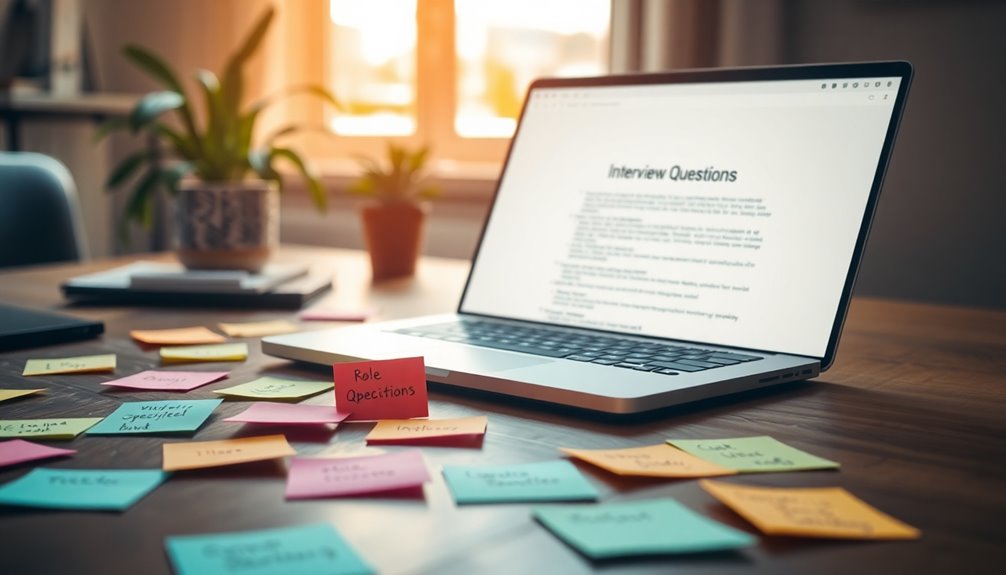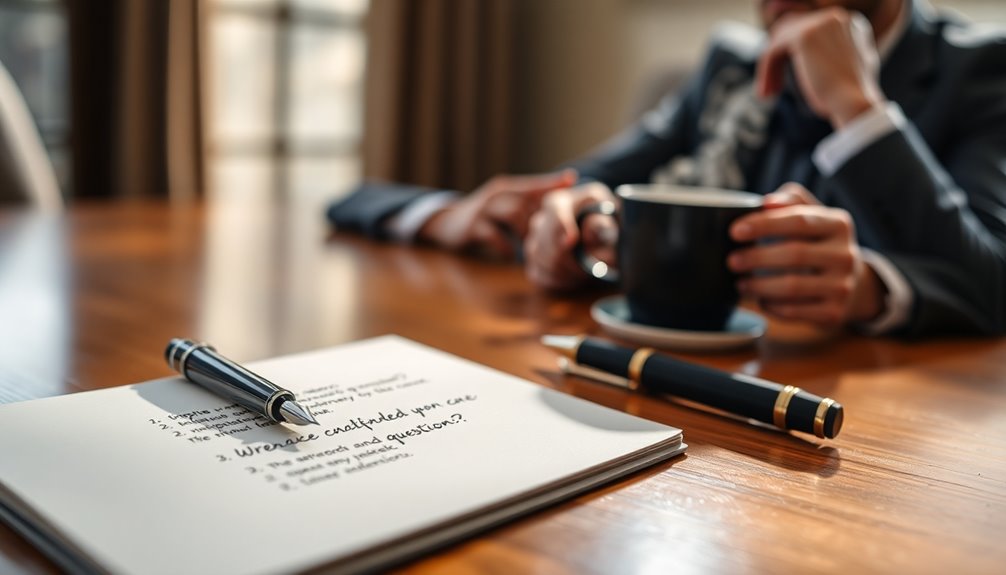Crafting impactful interview questions is easier than it might seem. Start by understanding your company's needs and values to tailor questions that reflect your culture. Analyze the job opening by listing key responsibilities and required skills. Define the ideal candidate profile, focusing on traits that lead to success. Create role-specific questions that invite candidates to share relevant experiences. Use open-ended inquiries to encourage detailed responses, fostering a comfortable environment. Finally, assess cultural fit and promote candidate engagement. With these steps, you'll enhance your interviewing skills, and uncover the specific techniques that can elevate your hiring process.
Key Takeaways
- Align interview questions with company culture and core values to ensure candidate fit and effectiveness.
- Focus on role-specific responsibilities and required skills to create targeted and relevant inquiries.
- Use open-ended questions to encourage candidates to elaborate on their experiences and showcase their personality.
- Tailor questions to probe for specific examples that demonstrate candidates' capabilities and problem-solving skills.
- Foster a comfortable interview atmosphere to promote meaningful discussions and better understand candidates' motivations.
Understanding Company Needs

When crafting interview questions, understanding your company's needs is essential for finding the right fit. Start by evaluating your company culture; this helps you tailor questions that resonate with potential candidates.
Identify core values like integrity and respect, which should reflect in your inquiries. Determine what support your team requires and review job descriptions for specific duties that need addressing.
Research your organizational goals to guarantee alignment with the candidates' skills and aspirations. By grasping these aspects, you can create targeted questions that not only evaluate candidates' qualifications but also gauge their compatibility with your team and company culture, ultimately leading to a more successful hiring process. Additionally, consider employing agile methodologies to enhance your hiring process and ensure continuous improvement in candidate selection.
Analyzing Job Openings

Understanding your company's needs sets the stage for analyzing job openings effectively. Start by listing the key responsibilities of the position.
Determine the qualifications and skills required for candidates to excel in the role. Assess the necessary experience levels and consider how the position can evolve or offer growth opportunities.
Review the job description closely, guaranteeing it aligns with your organizational goals. This process not only clarifies what you're looking for but also helps you craft focused interview questions that reflect the specific duties and expectations of the role. Additionally, leveraging data-driven marketing strategies can provide insights into the types of candidates who may best fit your company's culture and needs.
Defining Ideal Candidate Profile

Defining an ideal candidate profile is essential for ensuring that new hires align with both the role and the company culture.
Start by identifying the key traits that contribute to success in the position. Consider whether the role requires strong teamwork or independent work, and assess how candidates can adapt to fast-paced environments.
Clarify expectations regarding work schedules and responsibilities. Evaluate the skills and qualifications needed, along with the necessary experience levels.
Understanding these elements helps you create a clear vision of your ideal candidate. By defining this profile, you can tailor your interview questions effectively, ensuring you select candidates who not only meet the job requirements but also fit seamlessly into your organizational culture.
Crafting Role-Specific Questions

Crafting role-specific questions is essential for pinpointing the right talent for your team. Start by reviewing the job description and identifying the key responsibilities and qualifications needed.
Tailor your questions to focus on relevant experiences that align with these requirements. For instance, ask candidates to share specific examples of how they've handled tasks similar to those in the role.
Incorporate inquiries about cultural fit based on your company's core values—this guarantees candidates resonate with your team dynamics. Adjust the tone of your questions to reflect the work environment, whether it's casual or formal.
Utilizing Open-Ended Questions

Open-ended questions serve as powerful tools in interviews, allowing candidates to express themselves in detail. By using these types of questions, you not only gather insightful information but also encourage a more engaging conversation.
Here are three key benefits of utilizing open-ended questions:
- Enhanced Detail: Candidates can elaborate on their experiences, providing you with richer insights into their qualifications.
- Promotes Discussion: These questions foster a dialogue, making candidates feel more comfortable sharing their thoughts and experiences.
- Reveals Personality: Open-ended inquiries can uncover a candidate's values and work style, helping you gauge if they're a cultural fit for your organization.
Incorporating these questions into your interview process can lead to more meaningful interactions and better hiring decisions.
Implementing Behavioral Questions

Implementing behavioral questions in interviews can greatly enhance your ability to predict a candidate's future performance based on their past experiences.
These questions focus on real-life situations, encouraging candidates to share specific examples that showcase their skills and decision-making processes. Use the STAR method (Situation, Task, Action, Result) to guide candidates in providing structured responses.
For instance, ask about a time they resolved a conflict or adapted to a major change at work. This approach not only reveals their problem-solving abilities but also highlights their adaptability and teamwork skills.
Evaluating Cultural Fit

Cultural fit plays an essential role in the success of any team, influencing collaboration, engagement, and overall job satisfaction.
To evaluate a candidate's fit within your organization, focus on aligning their values with yours.
Consider asking questions that investigate:
- Alignment with Company Values: Inquire about their understanding and appreciation of your core values.
- Previous Cultural Experiences: Explore how their past work environments shaped their approach to teamwork and collaboration.
- Adaptability: Assess their ability to thrive in diverse environments and handle feedback constructively.
Encouraging Candidate Engagement

Engaging candidates during the interview process is essential for creating a positive experience and fostering a genuine connection. To achieve this, you can employ various strategies that encourage interaction and dialogue. Additionally, incorporating elements of the Law of Attraction can help create a more positive and open atmosphere.
| Strategy | Purpose | Example Question |
|---|---|---|
| Open-Ended Questions | Promote discussion | "Can you tell me about a challenging project?" |
| Candidate Questions | Assess interest and research | "What do you want to know about our team?" |
| Follow-Up Questions | Deepen understanding | "Can you elaborate on that experience?" |
| Reflective Questions | Encourage self-assessment | "What did you learn from that situation?" |
Frequently Asked Questions
How Do I Prepare for an Interview Effectively?
To prepare for an interview effectively, start by researching the company and understanding its culture and values.
Review the job description to identify key responsibilities and required skills.
Practice answering common interview questions, focusing on your experiences and how they align with the role.
Don't forget to prepare thoughtful questions to ask the interviewer.
Finally, dress appropriately and arrive on time to make a great first impression.
What Common Mistakes Should Candidates Avoid During Interviews?
During interviews, you should avoid common mistakes like being unprepared.
Don't forget to research the company and understand the role.
Also, steer clear of negative talk about past employers, and keep your answers concise and relevant.
It's crucial to listen carefully and engage with the interviewer, rather than rambling.
Finally, don't forget to follow up with a thank-you note, showing your appreciation and interest in the position.
How Can I Follow up After an Interview?
Did you know that 80% of hiring managers appreciate a follow-up message after an interview?
It's a great way to express gratitude and reinforce your interest in the position. You can send a brief email thanking the interviewer for their time, highlighting a key point from your conversation, and reiterating your enthusiasm for the role.
Aim to send this within 24 hours to leave a positive impression and keep yourself top of mind.
What Should I Wear to an Interview?
When deciding what to wear to an interview, consider the company culture. If it's formal, opt for a suit or professional dress.
For a casual environment, smart casual attire works well. Make sure your clothes are clean and pressed.
Pay attention to grooming; neat hair and minimal accessories can enhance your appearance.
How Long Should an Interview Typically Last?
An interview typically lasts between 30 minutes to an hour.
It's important to keep it concise yet thorough, allowing enough time for both you and the interviewer to discuss key points.
You should aim for a balance: don't rush through your responses, but also be mindful of the time.
If the conversation flows well, it might extend longer, but staying within that timeframe usually keeps everyone engaged and focused.
Conclusion
In the end, crafting impactful interview questions is like tuning a musical instrument; each question needs to resonate with your company's goals and culture. Just as a well-tuned guitar creates beautiful music, well-thought-out questions reveal the harmony between candidates and your team. By focusing on the right elements, you'll not only find the right talent but also foster a collaborative environment that drives success. Remember, every question is a note in the symphony of your hiring process.









